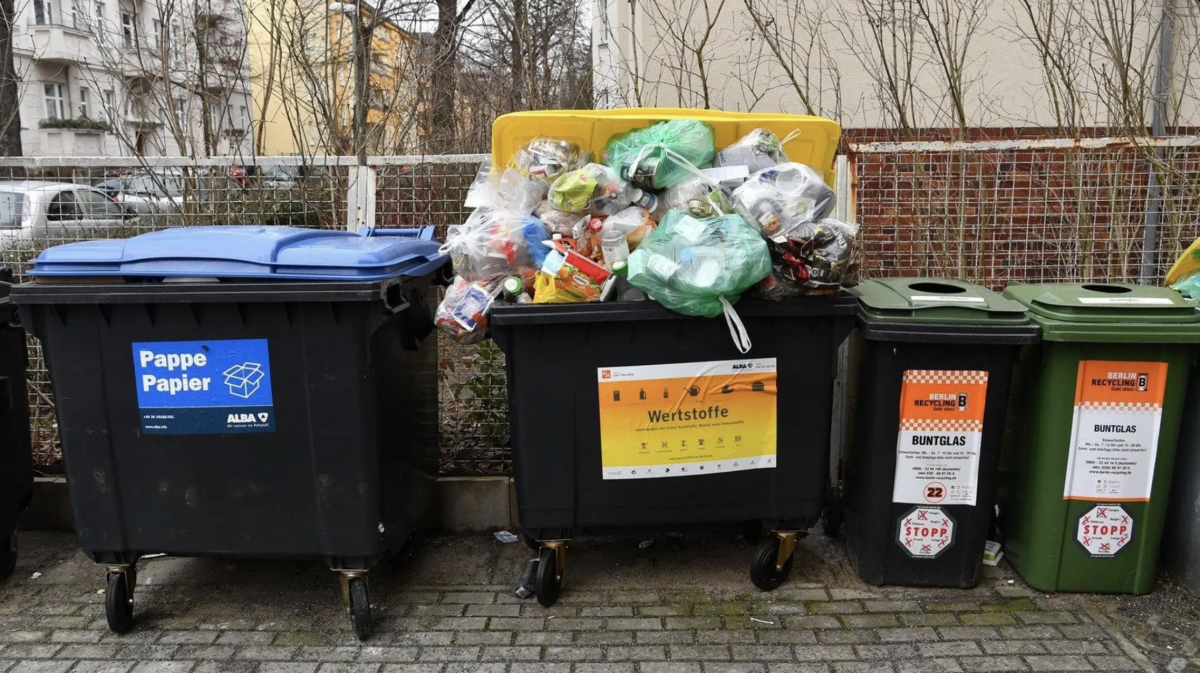Corona pandemic leads to significantly more glass and plastic waste
Source: Heise.de added 14th Dec 2020Germany’s garbage collectors have collected significantly more glass and plastic this year than before. The quantities of these two types of waste increased by around six percent compared to the previous year, according to a survey conducted by the Federal Association of German Waste Management, Water and Raw Materials Management (BDE) among its member companies. In addition to plastics, light packaging also includes canned goods. The reason for the plus is the coronavirus: Because of the pandemic, people go to restaurants less or not at all, instead they buy more or have food delivered.
Less newsprint – more cardboard boxes According to the information, there was only an increase of around two percent in paper waste. Here, however, there was a shift in the types of paper: While the amount of graphic paper – especially newsprint – fell significantly again due to digitization, significantly more cardboard boxes ended up in the garbage cans and containers. This in turn was due to the booming online trade.
The survey is about household waste. The dividing line to commercial waste, the amount of which the BDE survey did not allow any precise conclusions to be drawn, is fuzzy.After all, restaurants sometimes bring their empty wine bottles to the container around the corner – quantities from these collection containers were included in the survey.
“Waste avoidance hardly possible” BDE President Peter Kurth evaluated the survey results as evidence that that in Corona times it is hardly possible to pay attention to waste avoidance. “In order to actually reduce waste, consumers currently only have the option of carefully considering which items they want to buy in the online shop or in stationary retail for Christmas.”
The industry representative pointed out a problem: Many people throw their used mouth and nose protection and rubber gloves in the yellow bin or in the yellow sack, even though they belong in the general waste. “These materials are not packaging materials,” emphasized Kurth. “Their composition is unsuitable for the recycling process.” If such waste ends up in the wrong bin, it makes work more difficult for the waste recyclers – in the worst case, parts of the packaging are sorted out and end up in the incinerator. In the industry one speaks of “lost batches”.
Hygiene concepts also for waste processing Like other industries, the garbage collection, sorting plants and waste recyclers had introduced extensive hygiene concepts. The head of the association was relieved that these concepts had worked well. “There have been no widespread failures in disposal due to quarantine measures for employees,” said Kurth. “I am sure that our industry will also fulfill its tasks in Germany in the second Corona wave.”
The BDE has around 750 Members from all areas of waste management – whether garbage collection, sorting or incineration plants, whether recyclers or suppliers. Remondis from NRW is the market leader in the industry. A company spokesman reported a strong increase in volume, especially for glass – depending on the region and month, the increase was up to 20 percent.
Beverage consumption at home fills waste glass containers After significantly higher demand in March and April, when the restaurants had to close for the first time, the situation in the Relaxed summer months, so the Remondis spokesman. In the second phase of the gastro closings, which has been going on since the beginning of November, the glass volumes are increasing again. “People currently no longer consume their drinks in restaurants, but at home – that’s why a lot more glass ends up in our containers.”
In some places, the pick-up containers are full much earlier than usual after they have been emptied. “Usually, containers are only full that quickly after Christmas and New Year’s Eve.” The spokesman emphasized that Remondis could not simply empty the containers more often to solve the problem. After all, the pick-up times are part of the contract between the municipalities and the dual systems. The dual systems, in turn, commission garbage collectors to empty them.
Environmentalists are concerned about the higher volume of waste. “The corona crisis is also a plastic crisis,” says Greenpeace consumer expert Viola Wohlgemuth. Many food and retail companies rely more on packaging and thus suggest more safety for the consumer, she criticizes. “That’s a myth – it is not plastic that helps against the virus, but hygiene.”
She finds it unfortunate that so many bakeries and supermarkets No mugs or Tupperware that were brought along were accepted for coffee, cheese or pasta, although this would be harmless if normal hygiene rules were observed. Companies often no longer allow the filling of Tupperware that they have brought with them because they are unsure about the exact state requirements in this regard. “We are calling for uniform nationwide specifications that enable environmentally friendly consumption and would make an important contribution to reducing plastic waste,” says the environmentalist.
(tiw)
brands: AM Dual Glass longer New other Wave media: Heise.de
Related posts
Notice: Undefined variable: all_related in /var/www/vhosts/rondea.com/httpdocs/wp-content/themes/rondea-2-0/single-article.php on line 88
Notice: Undefined variable: all_related in /var/www/vhosts/rondea.com/httpdocs/wp-content/themes/rondea-2-0/single-article.php on line 88
Related Products
Notice: Undefined variable: all_related in /var/www/vhosts/rondea.com/httpdocs/wp-content/themes/rondea-2-0/single-article.php on line 91
Warning: Invalid argument supplied for foreach() in /var/www/vhosts/rondea.com/httpdocs/wp-content/themes/rondea-2-0/single-article.php on line 91
